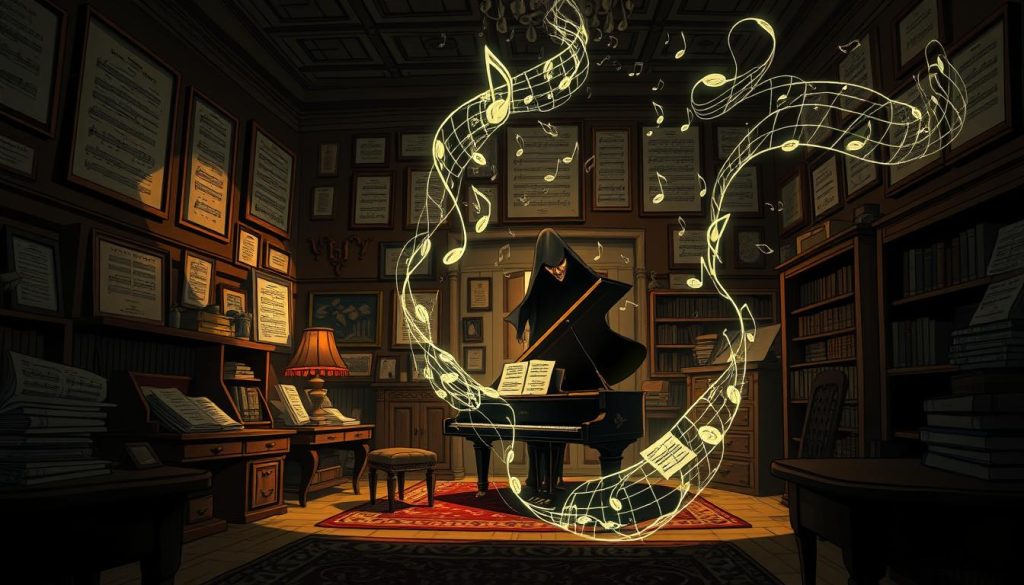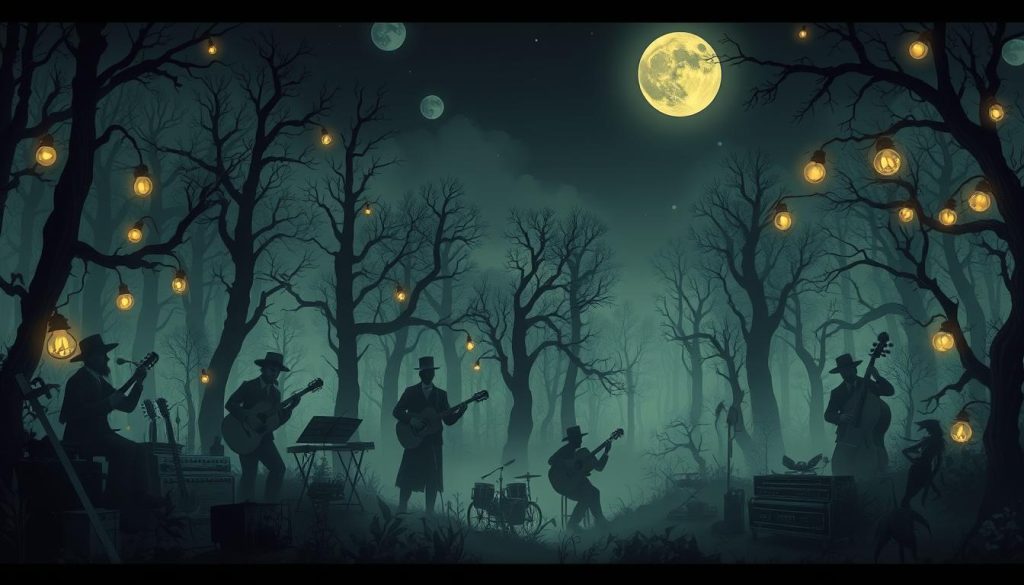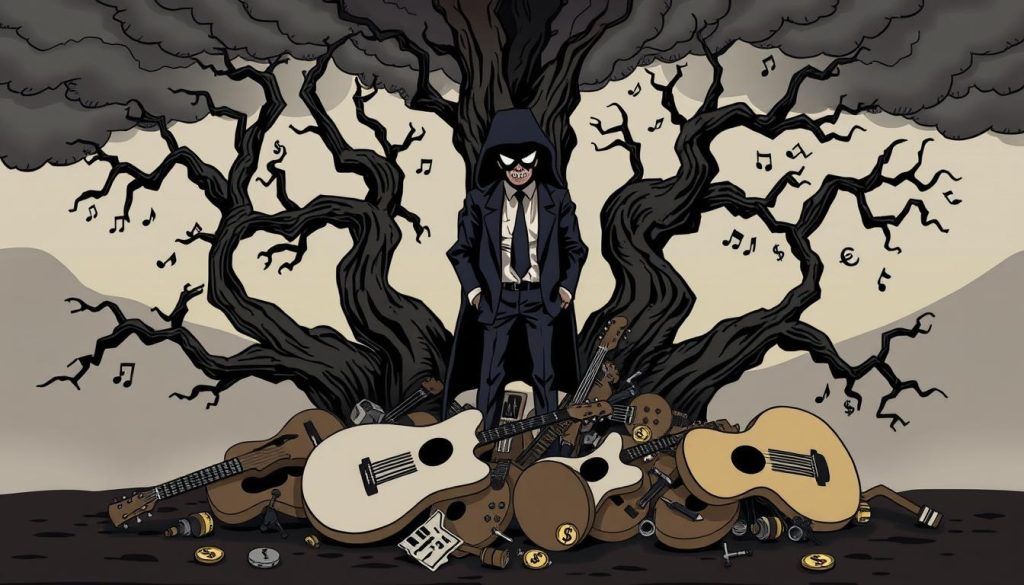The world of music publishing is often full of secrets. Artists feel trapped in an industry that seems to own their soul. This article dives into the hidden side of the music business. It uncovers the myths and controversies that artists face.
From the “Faustian pact” at the crossroads to exploitative practices, we explore it all. Readers will learn about the dark forces controlling an artist’s creativity and success1.
Key Takeaways
- The music publishing industry is shrouded in mystery and controversy.
- Artists often feel trapped in an industry that can control their creative freedom and success.
- Myths like the “Faustian pact” at the crossroads reveal the dark forces at play in the music business.
- Exploitative practices and unethical dealings are common in the industry, affecting artists’ livelihoods.
- This article aims to provide a deeper understanding of the shadowy world of music publishing.
The Crossroads Myth: Selling Your Soul for Musical Mastery
The “Faustian pact” at the crossroads has long fascinated blues and rock musicians. It’s a myth where one trades their soul to the Devil for musical greatness. This legend is tied to famous bluesmen like Robert Johnson and Tommy Johnson, who were said to have made such a deal2.
The Origins of the Faustian Pact in Blues Music
Robert Johnson’s music career was short but very influential. He recorded 29 songs in two sessions from 1936 to 1938. These songs were mostly released as 78 rpm singles3. His mysterious life and talent sparked a lot of research, including a 1961 album and a 2019 biography3.
European Folklore and the Crossroads
The crossroads theme in blues music comes from European folklore. These stories about liminal spaces existed before their American versions2. Even the violinist Paganini was rumored to have sold his soul for his talent2. These tales have shaped the cultural legacy of blues and rock.
The crossroads myth in blues music shows our deep interest in the supernatural and the pursuit of greatness. It’s a mix of folklore, superstition, and the human quest for transcendence. This continues to draw in audiences and inspire musicians today.
The Supernatural World: Myths and Beliefs in Early 20th Century America
In the early 20th century, many Americans believed in the supernatural. Miracles, devil sightings, and paranormal events were seen as real. These beliefs, from Europe, Britain, and Africa, shaped American culture4.
These myths and superstitions deeply affected musicians in the music industry. They created the myths and legends that defined the dark side of the business.
Mythology is the study of sacred stories that explore human nature4. These stories were present long before they were written down4. Joseph Campbell found that myths share common themes and characters worldwide4. Scholars Maria Leach and Jerome Fried say myths explain the world, religious beliefs, and cultural traits4.
These myths and beliefs greatly influenced the music industry5. Blues musicians and crooners were all touched by the supernatural. It shaped their experiences and the legends of the music publishing dark world, shady music dealings, and controversial music practices.
The impact of these myths and beliefs in early 20th century America was huge. They created a world of the supernatural that defined the music industry. The crossroads myth and tales of Faustian pacts were part of this mysterious world.
music publishing dark world: The Shady Business of Music Rights
The music publishing dark world is filled with complex and unclear music rights and publishing contracts. This can make artists feel trapped. Their creativity is controlled by the fine details in these agreements6.
Understanding Music Publishing Contracts
Looking into the shady music dealings, music publishing contracts have terms that affect an artist’s career and earnings. These contracts often favor the publishing company over the artist. They deal with music rights and how royalties are split6.
The Role of Performing Rights Organizations (PROs)
Performing Rights Organizations (PROs) play a big role in the controversial music practices. They collect and distribute royalties to songwriters and publishers. But, their methods have been questioned for possibly being unfair6.
Private equity firms have invested a lot in music rights, with $12 billion in 2021 alone. This is more than the total investment in the decade before the pandemic6. It shows how profitable the music publishing dark world is, as these firms aim to make money from popular songs’ royalties6.
The music industry has $2.59 trillion in uninvested assets. The $12 billion in music rights investment is a small part. This highlights the chance for more control and consolidation in the industry6.
Buying rights to hit songs, like Whitney Houston’s “I Wanna Dance With Somebody (Who Loves Me),” can cost up to $100 million. Artists like Stevie Nicks and Shakira have sold their catalogs for hundreds of millions. They do this due to less touring income and worries about tax hikes6.
Private investment firms like Carlyle and Blackstone are making money from songs like Katy Perry’s “Firework” and Bruce Springsteen’s “Born to Run.”6
The music industry is changing. Old songs are being used in new ways, like holographic concerts and TV shows. This brings in profits for these firms6.
As the industry grows, the role of PROs and the details of music publishing contracts will keep shaping the shady music dealings and controversial music practices artists face6.
“Being an entrepreneur, I view providing clear paths to artists to understand their options as crucial.”
– Salaam Remi, music producer7
The music industry is seeing a shift. Old songs are being used in new ways, like holographic concerts and TV shows. This trend shows how important it is for artists to know about music rights and publishing contracts to avoid being taken advantage of6.
Analog Metaverse has a catalog of around 2,000 high-quality songs, including hits like “Girl On Fire” by Alicia Keys. This highlights the value of music catalogs in the industry7. As the industry evolves, artists need to understand their options through performing rights organizations and publishing contracts. This will help them navigate the music publishing dark world and protect their work76.
Behind the Scenes: The Dark Side of the Music Industry
The music publishing dark world is filled with exploitative practices and unethical dealings8. A&R scouts in big music labels look for new bands. They are often the same age as the bands they want to sign8. Some famous A&R people are also rock fans, making it hard to tell who is real and who is just pretending.
The shady music dealings don’t end there8. A&R scouts promise bands things without writing it down, relying on trust8. Once bands sign, they are stuck with deals that never end, trapped by music industry corruption8. This can make bands stressed and inactive.
Exploitative Practices and Unethical Dealings
The controversial music practices go beyond just contracts9. Ticketmaster’s parent company is set to make $16 billion in 2022, more than the whole U.S. record industry made in 20219. They have exclusive deals and are accused of price-fixing, showing the huge power they have9. The music world mostly goes along with these exploitative music contracts.
10 The music world is tough, not just for business. Almost 85% of music movies show artists under pressure from producers and the media10. And 74% of these films make the music industry look cruel and sneaky10. These numbers show how hard it is for artists in this world.
When we look behind the scenes of the music publishing dark world, we see a lot of problems. There’s shady music dealings, unethical music promotions, exploitative music contracts, and a lot of pressure on artists. The music industry corruption is a big issue that needs to be faced.
Navigating the Music Publishing Landscape
Entering the world of music publishing can feel daunting. But, with the right tools and strategies, you can conquer this field. You’ll learn to safeguard your creative work11.
It’s vital to grasp the different publishing agreements. A standard deal splits royalties 50/50 between the publisher and songwriter12. Co-publishing agreements give songwriters about 25% of publishing rights, plus their songwriter’s share12. If you want full control, an administration deal might be best. It offers professional management while keeping your rights12.
Knowing about various income sources is key. This includes mechanical royalties and public performance royalties12. Synchronization license fees can change a lot, depending on where your music is used12.
| Revenue Stream | Description |
|---|---|
| Mechanical Royalties | Earned when a song is reproduced physically or digitally, such as through CD pressings or digital downloads. |
| Public Performance Royalties | Collected when music is broadcast or played in public venues, by organizations like ASCAP, BMI, or SESAC. |
| Synchronization Licensing | Fees earned when a song is used in media, with global advertising campaigns commanding higher rates. |
Music publishers are crucial in the industry. They manage copyright, licensing, and royalties. This ensures you get paid for your work12. They also offer creative support and help find new talent12.
By diving into the world of music publishing, you can confidently protect your rights. You’ll also boost your earnings as a musician or songwriter11.
“The key to success in the music industry is understanding and properly managing both composition and master rights. For a TV show usage, for example, both rights holders receive compensation.”
Conclusion
Your journey through the music publishing world has ended. It’s clear that the industry’s secrets and underworld are not for the faint of heart13. The Library of Congress’ World War I sheet music collection shows the industry’s complexities and challenges13.
The music industry is known for being shadowy. It’s a place where creativity and legal rights can be at risk14. But, with streaming services changing, there’s hope for a fairer future14.
To succeed, artists need to know their rights and be careful. Understanding the dark side of music publishing helps protect your work. This way, you can keep your music safe and share it with the world.
FAQ
What is the “Faustian pact” at the crossroads, and how does it relate to the music industry?
How did the supernatural world and beliefs influence the music industry in the early 20th century?
What are the complexities and potential pitfalls of the music publishing industry?
What are some of the exploitative practices and unethical dealings that characterize the music industry’s dark side?
How can artists and songwriters navigate the treacherous waters of the music publishing industry?
Source Links
- All About Library Music: Part 10
- A History of Musicians and the Crossroads – OPOSSUM
- Robert Johnson
- 1: Introduction to World Mythology
- The World’s Greatest Myths and Legends
- Opinion | Same Old Song: Private Equity Is Destroying Our Music Ecosystem
- Salaam Remi on producing, the music business, and ‘pushing the transparency button’ – Music Business Worldwide
- The Problem with Music | Steve Albini
- Ticketmaster’s Dark History
- The 10 Best Movies About The Music Industry, Ranked
- Songs and the Music Publishing Market Part I – Music Consultant
- Music Publishing 101: What You Need to Know
- Observations and Conclusions | America’s War, as Viewed by Publishers and the Public | Articles and Essays | World War I Sheet Music | Digital Collections | Library of Congress
- Conclusion



